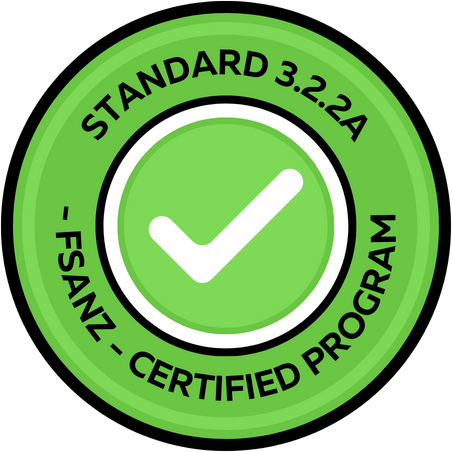Quick Links
Standard 3.2.2A Summary
What are the key Food Safety Laws changes?
Changes to Australia New Zealand Food Standards Code
Starting from December 8, 2023, significant modifications to the Australia New Zealand Food Standards Code (Standard 3.2.2A) will be implemented. These changes introduce a series of mandatory adjustments aimed at enhancing food safety measures within the food service industry. The alterations encompass obligatory training for food handlers, recertification requirements for food safety supervisors, and an augmentation in record-keeping protocols. The impact of these food safety laws changes extends across various sectors including hospitality, healthcare, and early childhood and aged care services. Adherence to these changes is of paramount importance to ensure compliance and uphold food safety standards.
It is crucial for businesses to familiarise themselves with Standard 3.2.2A and its implications on their operations, acting promptly to align with the new regulations. By embracing these adjustments, businesses can maintain their commitment to food safety, protect their customers, and steer clear of potential penalties. Staying informed and taking proactive steps will contribute to the success and credibility of your food business.
Key Food Safety Laws Changes
Check Your Compliance for FREE!
And we will generate your own personal compliance analysis and recommendations.
Answer our short checklist and one of our Compliance Advisors will review your answers and generate your own personalised recommendations for staying compliant with Standard 3.2.2A and the food safety laws changes.
Who Standard 3.2.2A Affects
How the Food Safety Laws Changes Affect You
If you're in the food business, Standard 3.2.2A matters to you. It sets the rules for food safety, whether you run a restaurant, café, or any other food-related place. Here, you'll find out if and how it affects your business.
In summary, if you serve or prepare food in any industry in Australia, then these changes impact you.
The Standard 3.2.2A changes applies to the following food service and closely related retail businesses, categorised as either category one or category two businesses:
- Restaurants
- Cafés
- Pubs
- Hotels with table service
- Smorgasbords
- Supermarkets and delis
- Takeaway shops / milk bars
- Hospitals
- Aged care facilities
- Childcare centres
- Canteens
- Mobile food vendors
- Bakeries
- Juice bars
- Supermarkets
- Service stations
- Clubs serving food
This change affects all food-serving or preparing businesses in VIC, NSW, QLD, ACT, SA, WA, TAS & NT.
If you aren't sure if this affects your business then contact CFT's Compliance Support Officer to help you navigate the food safety laws changes effectively.
Industry-Wide Impact: The changes affect a broad range of sectors, including hospitality, healthcare, and early childhood and aged care services.
Compliance Emphasis: Adhering to the new standards is crucial for maintaining compliance and upholding food safety measures.
Operational Understanding: Businesses need to thoroughly understand Standard 3.2.2A and its implications to ensure seamless integration of the changes.
Prompt Action: Timely adaptation is essential to uphold food safety standards, protect customers, and avoid potential penalties.
Contact CFT for help & support:
If your business is affected, reach out to CFT's compliance support officer to navigate the changes effectively. Act promptly to ensure your business is aligned with the new food safety laws and maintains its commitment to food safety.
Penalties for non-compliance with food safety laws, such as Standard 3.3.2A, can vary depending on your jurisdiction and the severity of the violation. However, here's a general summary of potential penalties:
Fines: Food businesses found to be in violation of food safety standards may face fines imposed by regulatory authorities. The amount of the fine can vary widely, with more serious violations typically resulting in higher fines.
Closure Orders: In cases of severe non-compliance that pose an immediate threat to public health, regulatory authorities may issue closure orders. This means your business could be shut down until the issues are rectified.
Prosecution: In some instances, especially for repeated or egregious violations, legal action may be taken against the business owner or responsible individuals. This can lead to criminal charges, which may result in fines, probation, or even imprisonment.
Loss of Reputation: Non-compliance can damage your business's reputation, leading to a loss of customer trust and decreased revenue. Negative publicity can have long-lasting effects on your brand.
Recalls and Product Liability: If non-compliance results in contaminated or unsafe food reaching consumers, the business may be required to issue product recalls. This can be costly and damaging to your business's bottom line.
Increased Regulatory Scrutiny: After instances of non-compliance, your business may be subject to more frequent and rigorous inspections, audits, and scrutiny from regulatory authorities.
It's crucial to prioritise compliance with Food Safety Standards to avoid these penalties, as they can have significant financial, legal, and reputational consequences for your business. Staying informed about local regulations and investing in proper training and procedures can help you maintain a safe and successful food operation.

Are You Operating an Early Childhood Centre in NSW?
If you are an early childhood centre operating in NSW you will now need to complete the NSW Food Authority FSS certification.
Click here to find out more more: New Food Safety Standards in NSW Childcare
Roles Affected by Standard 3.2.2A Changes
Confused About the Changes?
If you haven't found the answers to your questions, or you would like to know more, our Compliance Team is ready to help.
You can use our Chat in the bottom right-hand corner of the screen, or call us on 1300 665 633
Be standard 3.2.2A Compliant
What You Need to Do To Be Compliant
The new requirements outlined in Standard 3.2.2A demand a higher level of compliance compared to previous regulations. Failure to comply can have serious consequences.
Enforcement of the food safety laws begins in 2023 and is overseen by local governments. Penalties for non-compliance vary based on the severity of violations and the jurisdiction, potentially leading to fines, license suspension, or even revocation.
Non-compliance also poses risks to your brand, reputation, customer base, and potential legal actions from affected consumers.
1
Train Your Food Handlers
Ensure all your food handling staff complete the necessary training program. This program equips them with the skills and knowledge required for safe food handling practices.
2
Nominate Food Safety Supervisors
Appoint qualified Food Safety Supervisors to oversee food handling practices. They must have recent qualifications and the authority to ensure safe food handling.
3
Maintain Records
Develop a record-keeping system that covers the nine prescribed activities. Category 1 businesses are required to maintain records using an approved system and provide evidence upon request.
Standard 3.2.2A FAQs
Your Top 10 Questions Answered
All Australian states & territories: New South Wales, Victoria, Queensland, South Australia, Western Australia, Tasmania, the Northern Territory, and the Australian Capital Territory.
Determine your required tools by downloading the CFT Action Plan and identifying your business category.
Download here: Action Plan
Yes, Standard 3.2.2A mandates food handler training across Australia, covering safe handling, contamination, cleaning, sanitising, and personal hygiene.
Yes, it must be renewed every 5 years. Food Safety Supervisors oversee safe handling and need proper training.
Learn more about Refresher Courses here: Food Safety Supervisor Refresher Courses
For businesses operating over 8 hours or with shift workers, two Food Safety Supervisors per location are recommended.
Standard 3.2.2A requires evidence-based record-keeping. Maintain records for prescribed activities and demonstrate compliance to authorised officers.
They manage safe food handling and ensure food safety, especially for high-risk items, requiring proper training.
Learn more about the FSS role here: FSS
Yes, we have approved programs which are offered online, ensuring compliance with the standard.
View our Food Safety Handler Courses.
Non-compliance can result in health risks, legal penalties, and harm to your business's reputation.
You can ensure a seamless transition by staying updated on the requirements, accessing our fact sheet, compliance quiz and seeking assistance from one of our compliance advisors.
3.2.2A Approved Programs
Choosing a Standard 3.2.2A Compliant Course
When you're picking a course to meet the Standard 3.2.2A, it's important to go for ones that have been thoroughly checked. At CFT, our compliance team reviews programs to make sure they meet the requirements. The ones that pass get the 3.2.2A Approved logo, showing they're in line with the standard. Choosing a course with this logo means you can trust it to cover what's needed. It's a simple way to make sure you're on track with the new food safety laws and ready for a smooth learning experience.

Popular Courses
Food Safety Laws: more information
Learn More About the Standard 3.2.2A Changes
Download Your FREE Standard 3.2.2A Fact Sheet!
We've designed a simple 3.2.2A Fact Sheet to guide your compliance journey. This template walks you through the necessary steps to be compliant!

Chat to one of our trainers
Our team are here to help with your questions




















